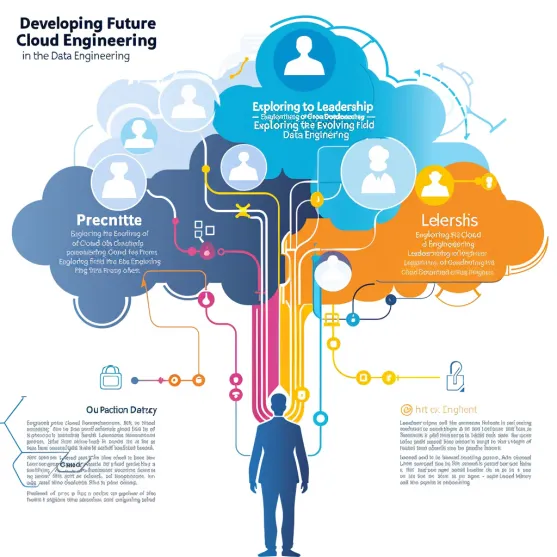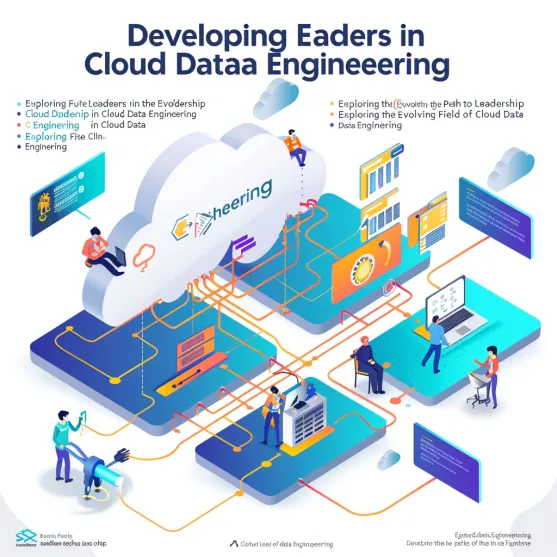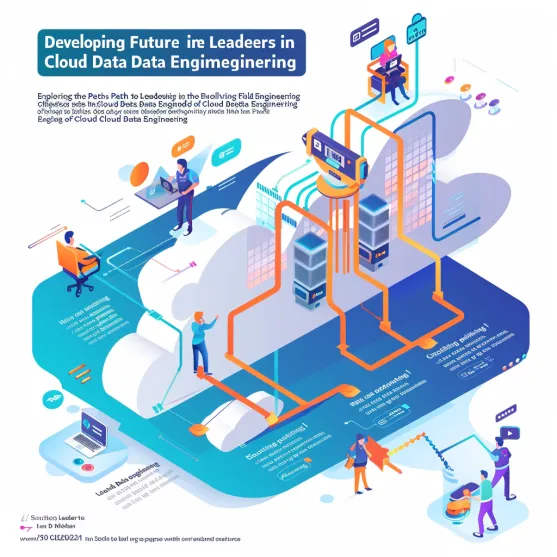Developing Future Leaders in Cloud Data Engineering
Exploring the Path to Leadership in the Evolving Field of Cloud Data Engineering

Introduction
The field of cloud data engineering is rapidly evolving, driven by the relentless pace of technological advancements and the increasing reliance on data-driven decision-making. As organizations continue to migrate their operations and data storage to cloud platforms, the demand for skilled professionals who can navigate this complex landscape is at an all-time high. However, beyond technical expertise, there is a growing need for leaders who can guide teams and projects towards successful outcomes in this dynamic environment.
Developing future leaders in cloud data engineering involves more than just equipping them with the necessary technical skills. It requires a holistic approach that includes fostering leadership qualities, promoting strategic thinking, and encouraging a deep understanding of both the technological and business aspects of cloud data engineering. This development path is crucial for ensuring that the next generation of professionals is prepared not only to manage but also to innovate and drive the industry forward.
As we explore the path to leadership in cloud data engineering, it is essential to consider the various competencies and experiences that contribute to a well-rounded leader. This includes the ability to manage projects and resources effectively, the foresight to anticipate industry trends, and the interpersonal skills to motivate and inspire teams. By focusing on these areas, organizations can cultivate leaders who are not only proficient in technical skills but also adept at navigating the challenges and opportunities that the future holds.
Understanding Cloud Data Engineering
Understanding Cloud Data Engineering involves grasping the complex, dynamic field that integrates various technologies and methodologies to manage and process data in the cloud. This domain is pivotal for businesses aiming to leverage big data for strategic decision-making and operational efficiency.
At its core, cloud data engineering focuses on designing, building, and managing scalable data architectures in cloud environments. These architectures are designed to handle vast amounts of data, ensuring they are accessible, secure, and usable for analytics and business intelligence purposes. The role of a cloud data engineer encompasses several key responsibilities, including data modeling, data warehousing, data integration, and data optimization, all within cloud infrastructures.
- Data modeling in cloud data engineering involves defining how data is connected and how it will be stored and accessed. This process is crucial as it directly impacts the performance and scalability of data solutions. Effective data models are essential for supporting high-performance analytics and machine learning applications.
- Data warehousing in the cloud has transformed significantly with the advent of technologies like BigQuery, Amazon Redshift, and Azure SQL Data Warehouse. These solutions offer massive scalability and performance benefits over traditional on-premise data warehouses. They allow companies to store petabytes of data and query it rapidly, without the overhead of managing physical hardware.
- Data integration in this field involves combining data from different sources into a unified view. Cloud data engineers often use ETL (extract, transform, load) processes or more modern ELT (extract, load, transform) approaches to consolidate data in the cloud. This integration is critical for ensuring that the data used in decision-making is comprehensive and up-to-date.
- Data optimization in cloud data engineering is about enhancing the efficiency of data storage and access. This includes implementing data partitioning, indexing, and caching strategies to improve query performance and reduce costs. Cloud data engineers must continuously monitor and tune these systems to handle changing data volumes and query patterns effectively.
- Security is another critical aspect of cloud data engineering. Engineers must ensure that data is securely stored and that access is controlled to protect sensitive information. This involves using encryption, managing access controls, and complying with data protection regulations.
Understanding cloud data engineering requires a deep knowledge of cloud technologies, data management practices, and security measures. As businesses increasingly rely on cloud-based solutions to manage their data, the role of cloud data engineers becomes more critical in ensuring that data infrastructures are robust, scalable, and secure.

Essential Skills for Aspiring Leaders in Cloud Data Engineering
In the dynamic field of cloud data engineering, aspiring leaders must cultivate a range of essential skills to guide their teams and projects to success. These skills not only enhance technical proficiency but also bolster the ability to manage teams, innovate, and drive business outcomes effectively.
- Technical Expertise in Cloud Technologies: Proficiency in cloud platforms like AWS, Azure, or Google Cloud is fundamental. Leaders should not only understand the basics but also advanced services and solutions that can be leveraged to optimize data storage, processing, and analytics.
- Data Management and Architecture: Understanding the architectures that support large-scale data environments is crucial. This includes knowledge of data warehousing, ETL processes, and real-time data processing frameworks. Aspiring leaders should be adept at designing scalable and secure data solutions that meet the evolving needs of the business.
- Machine Learning and Analytics: With the growing reliance on data-driven decision-making, leaders in this field should have a solid grasp of machine learning algorithms and data analytics. This knowledge enables them to oversee projects that extract valuable insights from large datasets, enhancing business strategies and customer experiences.
- Business Acumen: Technical knowledge needs to be complemented with strong business acumen. Understanding the business implications of cloud data technologies enables leaders to make informed decisions that align with the organization’s strategic goals. This includes cost management, risk assessment, and understanding market trends.
- Communication and Collaboration: Effective communication is key in translating complex technical details into actionable insights for cross-functional teams. Leaders must be able to foster collaboration among team members, stakeholders, and external partners to ensure the alignment and successful execution of projects.
- Problem-Solving and Innovation: The ability to navigate challenges creatively and efficiently sets leaders apart. They should be capable of leading their teams through complex problem-solving processes and encourage innovation to maintain competitive advantage and adapt to new technologies.
- Ethical Leadership and Data Governance: As data privacy and security continue to be paramount, leaders must enforce strict data governance policies and ethical standards. This includes managing data access, ensuring compliance with regulations like GDPR, and setting an example of integrity and accountability.
- Continuous Learning and Adaptability: The tech field is ever-evolving, and leaders must commit to continuous learning and professional development. This not only involves staying updated with the latest technological advancements but also adapting to changing business environments and leadership practices.
By mastering these skills, aspiring leaders in cloud data engineering can effectively guide their teams, drive innovation, and contribute to the strategic goals of their organizations. These competencies help build a foundation that supports not only technical excellence but also a robust leadership presence in the competitive landscape of cloud technology.
Challenges and Opportunities in Cloud Data Engineering Leadership

The field of cloud data engineering is rapidly evolving, presenting a unique set of challenges and opportunities for current and future leaders. As organizations increasingly rely on cloud-based technologies for data management and analysis, the role of a leader in this space becomes critically important. This section explores the key challenges and opportunities that leaders face in cloud data engineering.
Challenges in Cloud Data Engineering Leadership
- Keeping Pace with Technological Advances: The technology landscape in cloud data engineering is constantly changing. Leaders must stay informed about the latest developments, such as advancements in cloud infrastructure, data storage solutions, and analytics tools. This requires a commitment to continuous learning and adaptability.
- Managing Data Security and Compliance: With the increasing amount of data being stored and processed in the cloud, security and compliance are major concerns. Leaders must ensure that their teams adhere to stringent data security policies and compliance regulations, which can vary by industry and region.
- Talent Acquisition and Retention: There is a high demand for skilled data engineers, and attracting and retaining top talent can be challenging. Leaders need to create an attractive work environment that not only draws skilled professionals but also fosters their growth and development within the organization.
- Balancing Innovation with Stability: While innovation is crucial in staying competitive, leaders must also ensure the stability of their data systems. They need to manage the risks associated with implementing new technologies and ensure that these innovations do not disrupt existing operations.
Opportunities in Cloud Data Engineering Leadership
- Driving Business Growth: Effective data management and analytics can significantly enhance decision-making and lead to better business outcomes. Leaders have the opportunity to drive growth by leveraging data insights to improve products, optimize operations, and enhance customer experiences.
- Enhancing Collaboration Across Teams: Cloud technologies facilitate greater collaboration across different teams and departments. Leaders can harness these capabilities to improve communication and cooperation within their organizations, leading to more integrated and efficient workflows.
- Promoting a Culture of Data Literacy: By fostering a culture that values data-driven decision-making, leaders can enhance the overall data literacy of their organization. This involves training teams to understand and use data effectively, which can improve performance across all levels of the organization.
- Leading Digital Transformation Initiatives: As organizations undergo digital transformations, leaders in cloud data engineering are well-positioned to lead these initiatives. They can guide their teams through the complexities of digital change, ensuring that the organization remains agile and responsive to new opportunities.
The role of a leader in cloud data engineering involves navigating a complex landscape of challenges and opportunities. By addressing these challenges head-on and leveraging the opportunities, leaders can significantly impact their organizations’ success in the digital age.
Strategies for Cultivating Leadership Skills in Cloud Data Engineering
In the rapidly evolving field of cloud data engineering, cultivating leadership skills is crucial for driving innovation and managing dynamic teams effectively. To develop future leaders in this domain, several strategic approaches can be employed, focusing on both technical and soft skills.
- Emphasizing Technical Mastery and Continuous Learning: Future leaders in cloud data engineering must possess a deep understanding of cloud technologies, data management, and architecture. Encouraging continuous learning through certifications, workshops, and courses in cutting-edge technologies like AI, machine learning, and big data analytics is essential. This not only keeps the team technically competent but also prepares them to lead with confidence in a technically demanding environment.
- Fostering Soft Skills Development: Leadership in cloud data engineering isn’t just about technical know-how; it also requires strong soft skills. Communication, teamwork, and problem-solving are critical. Programs that enhance these skills can be integrated into the professional development plans for potential leaders. Regular team-building activities and communication workshops can help in developing these essential skills.
- Creating Opportunities for Leadership Roles: Practical experience is invaluable. Providing emerging leaders with the opportunity to lead projects or take charge of a team can foster practical leadership skills. These opportunities allow potential leaders to experience decision-making, team management, and project oversight, which are crucial for their growth and development.
- Mentoring and Coaching: Establishing a mentoring program where experienced leaders coach the future leaders can be highly effective. These relationships can provide emerging leaders with insights and guidance on handling complex projects and making strategic decisions. Regular feedback and one-on-one coaching sessions can help in identifying strengths and areas for improvement.
- Encouraging Innovation and Risk-Taking: To lead effectively in cloud data engineering, leaders must be innovative and occasionally take calculated risks. Creating an environment that supports innovation and tolerates well-intentioned failures can encourage emerging leaders to think outside the box and bring transformative ideas to the table.
- Promoting a Culture of Inclusivity and Diversity: Effective leaders understand the value of diverse perspectives and inclusivity. Training programs that emphasize cultural competence and the benefits of diverse teams can prepare leaders to manage more effectively in diverse environments.
- Implementing Leadership Feedback Mechanisms: Constructive feedback is crucial for any leader’s growth. Implementing 360-degree feedback mechanisms where leaders receive feedback from their peers, juniors, and seniors can provide comprehensive insights into their leadership style and effectiveness.
By integrating these strategies, organizations can cultivate a new generation of leaders who are not only technically proficient but also skilled in managing teams with empathy, strategic insight, and innovation. This holistic approach to leadership development is essential for the sustained success and growth of cloud data engineering teams.

Case Studies: Successful Leaders in Cloud Data Engineering
The landscape of cloud data engineering is continually evolving, and the leaders who excel in this field often share common traits and strategies that set them apart. This section explores several case studies of successful leaders in cloud data engineering, highlighting their approaches, achievements, and the impact they have had on their organizations and the industry.
- Embracing Innovation and Continuous Learning
One prominent leader in cloud data engineering is the CTO of a leading tech company who has spearheaded multiple initiatives to integrate advanced analytics and machine learning into cloud data solutions. This leader emphasizes the importance of staying ahead of technology trends and encourages a culture of continuous learning and experimentation within their team. Under their leadership, the company has seen a significant increase in efficiency and a reduction in operational costs, attributing success to the proactive adoption of new cloud technologies and practices. - Fostering a Collaborative Team Environment
Another case study involves a Director of Engineering at a multinational corporation known for its cloud-based services. This leader focuses on building a collaborative environment where team members are encouraged to share ideas and solutions. By implementing regular brainstorming sessions and open forums, they have successfully fostered a culture of inclusivity and innovation. The result has been the development of groundbreaking cloud data management tools that have revolutionized client data interactions. - Strategic Vision and Business Acumen
A VP of Cloud Services at a renowned software company demonstrates how strategic vision combined with deep business acumen can propel a company forward. This leader’s approach involves aligning the cloud data engineering strategy directly with the business goals of the organization. They have been instrumental in developing a scalable cloud architecture that not only supports the company’s immediate needs but is also adaptable to future market changes. Their strategic initiatives have led to a robust data infrastructure that supports substantial business growth and customer satisfaction. - Commitment to Quality and Customer Satisfaction
Highlighting a commitment to quality, a Chief Data Officer at a leading analytics firm has set high standards for data quality and reliability. This leader has instituted rigorous testing and validation processes to ensure that the data architecture delivers accurate and timely data to end-users. Their dedication to quality has not only enhanced the company’s reputation but also increased client trust and satisfaction, leading to expanded business opportunities. - Leading by Example
Lastly, the founder of a startup specializing in cloud data solutions exemplifies leadership by example. Starting with a small team, this leader has been hands-on in developing innovative cloud solutions that cater to niche markets. Their direct involvement in projects and willingness to tackle technical challenges alongside their team has inspired a strong work ethic and loyalty among employees, driving the company to achieve remarkable milestones in a short span.
These leaders demonstrate that successful leadership in cloud data engineering is not just about technical expertise but also involves strategic thinking, a commitment to quality, fostering a positive team culture, and continuous adaptation to new technologies. Their achievements underline the potential of effective leadership to transform not only their organizations but also set benchmarks in the cloud data engineering sector.
Empowering the Next Generation of Cloud Data Engineering Leaders
Empowering the next generation of cloud data engineering leaders is crucial for the sustained innovation and efficiency in technology sectors. As industries increasingly rely on big data and cloud technologies, the demand for skilled leaders who can navigate and innovate in these areas will only grow. By investing in comprehensive education and training programs, fostering a culture of continuous learning and adaptation, and encouraging a mindset geared towards innovation and problem-solving, organizations can prepare their future leaders to not only meet the challenges of the digital age but to drive progress. These leaders will be pivotal in shaping the future of technology and business landscapes, making it essential to prioritize their development today.







